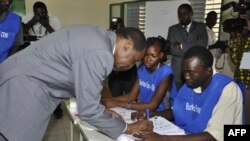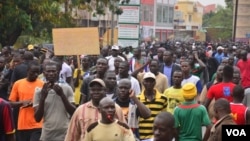DAKAR —
Nearly a week after Burkina Faso's opposition staged the largest demonstrations in decades to protest the ruling party's attempt to abolish constitutional term limits, analysts are saying President Blaise Compaoré is likely to face an uphill battle if he wishes to stay in office beyond next year.
Compaoré, who first came to power in a 1987 coup and then served two seven-year terms, most recently won a 2010 election to serve his final elected five-year term under a constitution that dates to 2000.
As Compaoré approaches the final year of his term, his Congress for Democracy and Progress party is now accused of attempting to revise Article 37 of the constitution, which limits presidents to serving two five-year terms.
According to Meluleki Mthembu, a researcher at the African Democratic Institute, changing the constitution will prove more challenging than it has been in the past.
“It will be very difficult. I mean, already the situation gives him certain pause on amending the constitution because the citizens are against that move," he said. "But the difference between 2000 and the current 2015 elections is that in 2000 Burkina Faso was a different country from now. Now, people, the citizens of Burkina Faso, seem to be more aware of their rights.”
While protests against constitutional amendments have so far been peaceful, Mthembu says the country could experience a great deal of upheaval if the president tries to run in the upcoming elections, scheduled for November 2015.
Mathias Hounkpe of the Open Society Initiative for West Africa (OSIWA) says the protests show the population won’t tolerate more changes to Article 37, and will continue to pressure the parliament to take their side.
“This is the first time in Burkina Faso when we are seeing this level of protests against the constitutional review of the provisions on the limitations, on the number of mandates, the number of terms," he said. "People don’t want him to stay anymore. When we look at, for instance, what the people are saying during the demonstrations last Saturday, they were saying that, after 26 years, that’s enough now, that he can step down now and let somebody else take over.”
Another indication that Compaoré would fail in upcoming elections: the recent resignation of more than 70 members of the ruling party, who have since aligned themselves with the opposition.
Compaoré has not made any public declarations about his 2015 intentions, but some experts say the entire West African sub-region is closely watching to see what his next move will be and how citizens will react.
According to Hounkpe, the outcome of Burkina Faso's 2015 polls could affect how things play out in neighboring countries such as Benin, where President Boni Yayi has proposed an amendment to a constitution that currently bans third presidential terms.
“So, for all of West Africa it is a good signal ... to see that citizens can prevent such things to happen.”
Following the opposition-led rallies last Saturday, the government issued a statement saying it remains open to political dialogue. Opposition leaders say they will continue their campaign to get Compaoré to step down next year.





